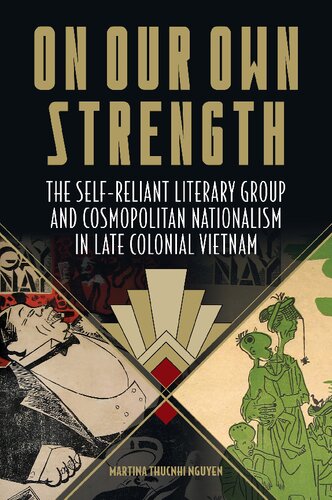

Most ebook files are in PDF format, so you can easily read them using various software such as Foxit Reader or directly on the Google Chrome browser.
Some ebook files are released by publishers in other formats such as .awz, .mobi, .epub, .fb2, etc. You may need to install specific software to read these formats on mobile/PC, such as Calibre.
Please read the tutorial at this link: https://ebookbell.com/faq
We offer FREE conversion to the popular formats you request; however, this may take some time. Therefore, right after payment, please email us, and we will try to provide the service as quickly as possible.
For some exceptional file formats or broken links (if any), please refrain from opening any disputes. Instead, email us first, and we will try to assist within a maximum of 6 hours.
EbookBell Team

5.0
98 reviewsOn Our Own Strength examines the political activities of the most influential intellectual movement in interwar French-occupied Vietnam. The far-reaching work of the Self-Reliant Literary Group (Tự Lực Văn Đoàn) included applied design, urban reform, fashion, literature, journalism, and cartoons; its work was deeply political in both form and intent. The Group drew upon a wide range of global intellectual currents and practices to build an enlightened public that would one day serve as the basis of a modern Vietnamese nation. Its nationalist vision sought a nonviolent middle path between colonialism and anticolonial struggle, advocating a process of gradual decolonization that ultimately ended in Vietnamese autonomy. This form of cosmopolitan nationalism proved tremendously popular among ordinary Vietnamese and necessarily shaped local politics, influencing the political agenda of even rival groups such as the newly revived Indochinese Communist Party (ICP). On Our Own Strength shows how the Group’s vision framed the ways ICP positioned itself and sought popular support in the years leading up to the August Revolution and beyond. In later years, the party attempted to erase the Group’s early influence on national politics, banning their writings and casting them as little more than bourgeois literary figures. In recovering the Group’s unique response to the world around them, this book bridges the areas of political, cultural, and intellectual history, drawing them together into a rich narrative of Vietnamese nation-building from the bottom-up within a larger global context.
On Our Own Strength offers a dynamic model for the field of Vietnamese studies as it continues to move beyond Cold War political narratives of its most tumultuous period. This book engages broadly with global history, European history, and imperial studies to explore colonialism’s hybrid cultural and political forms. Martina Thucnhi Nguyen examines how the Self-Reliant Literary Group weighed in on everything from women’s fashion and public housing to the major political ideologies of their era, in a unique style that mixed French-inflected ideas with Vietnamese norms and forms. As a deep case study of important figures on the Vietnamese moderate left, On Our Own Strength provides an injection of color and nuance into a history that is often too monochromatic.